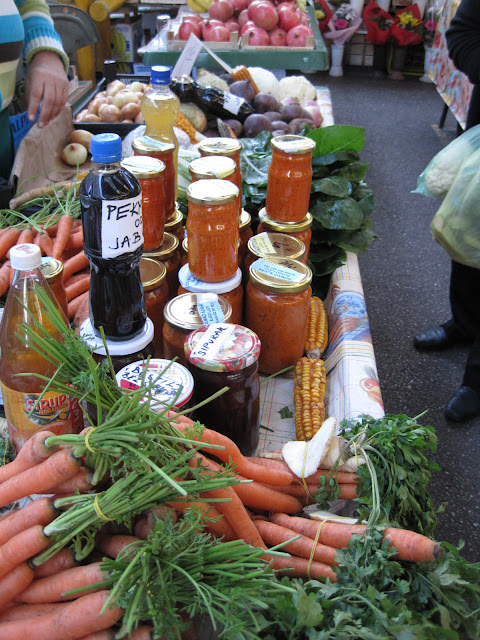Ajvar & winter food and preserves of Balkan
 |
| Home made preserves including ajvar on the markets of Sarajevo |
I know, this name (Ajvar, pronounced: I-vahr) sounds strange for many people outside of Balkans, but since I have spent last couple of weeks there and also it has been unusually cold in Vancouver lately, I thought it's time for some old-fashion, healthy preserves.
My trip was not tourism related, but still it's hard to come back without some impressive observations about life, people and food over there. That area went trough many bad things in last twenty years. Towns and people had changed; politics, wars and other evils..., but one thing is still the same and will likely remain for a long time - food.
Ajvar is a typical Serbian and Macedonian specialty; slightly more work-demanding version of Italian bruschetta, but for many people, especially with these Balkan roots, even tastier. Pure vegetarian, this relish, spread, salad or meal /"tapas"- meze addition, went trough many "food wars" over its name and ownership. There are also some slightly different versions and every family has his own secret and recipe. More respected is an ajvar with a good balance of peppers and eggplants. Spiciness is an additional kick, and sweet Hungarian peppers can be replaced with spicy ones, but only up to the certain point. Good ajvar has more orange in his color than red, that reflects that peppers are not the only ingredients in it.
There are now many producers from Balkan region, that are exporting commercially produced ajvar to Western Europe and America. Serbian and Macedonian producers are closest with his taste and texture to the home-made one, although I can tell that as an experienced ajvar lover and taster, there is no commercially produced ajvar as good as a home-made!
There are many versions and recipes to make a good ajvar, but there are also other popular spread and relish recipes. Lutenica or pinjur/pindzur is a chunkier version of ajvar with some addition of tomatoes.
( Dana's best recipe - tested )
For a large quantity you will need:
10 kg (22 lb) of red (Hungarian style) peppers
4 kg (9 lb) of eggplant
3 dl (1 cup) vegetable oil (sunflower)
salt (to your taste)
2 tbs sugar
5 cloves of garlic
Sliced eggplants and whole peepers must be baked thoroughly, in an oven or barbecue. The eggplants must be peeled, as well as the peppers (which are de-seeded after that.) On a manual meat grinder, grind the eggplants and peppers together. Then cook all that together, in vegetable oil, in a big pot, it should take about a couple of hours until you get a dense consistency (usually 3-4 hours is needed for the best results.) Season and add garlic, according to the taste, 1/2 hour before it is done. Pour ajvar into warm jars, and place it in the preheated 100C (150 F) oven, close the oven and turn the heat off. Leave the jars open like that over night in the oven. The heat will make a crust on the ajvar, this is usually a good sign that the ajvar will last long. Put the lids over and store in a cold place.
(Small quantity version - not tested)
You will need:
3 eggplants
For a large quantity you will need:
10 kg (22 lb) of red (Hungarian style) peppers
4 kg (9 lb) of eggplant
3 dl (1 cup) vegetable oil (sunflower)
salt (to your taste)
2 tbs sugar
5 cloves of garlic
Sliced eggplants and whole peepers must be baked thoroughly, in an oven or barbecue. The eggplants must be peeled, as well as the peppers (which are de-seeded after that.) On a manual meat grinder, grind the eggplants and peppers together. Then cook all that together, in vegetable oil, in a big pot, it should take about a couple of hours until you get a dense consistency (usually 3-4 hours is needed for the best results.) Season and add garlic, according to the taste, 1/2 hour before it is done. Pour ajvar into warm jars, and place it in the preheated 100C (150 F) oven, close the oven and turn the heat off. Leave the jars open like that over night in the oven. The heat will make a crust on the ajvar, this is usually a good sign that the ajvar will last long. Put the lids over and store in a cold place.
(Small quantity version - not tested)
You will need:
3 eggplants
30 good red field (Hungarian style) peppers
oil
garlic
vinegar (not needed, but if you want to last longer preferred)
salt
sterilized jars
Process should be the same, and if you plan to put a vinegar in, do it also at the end of cooking.
sterilized jars
Process should be the same, and if you plan to put a vinegar in, do it also at the end of cooking.
5 red Hungarian peppers baked
3 tomatoes baked in the oven and peeled
2-3 cloves of garlic
1 eggplant baked
1 small hot pepper (to the taste)
olive oil
Chop all the ingredients and put in a pan with a good amount of oil. Cook for about 1 hour 1/2 on a stove top on a very low temperature. Do the same like with ajvar if you are going to preserve it in a jars. Otherwise, if you will consume it in a week, refrigerating will do the job.
Parsley sauce preserve
One more preserve that would be great for any type of meat and is much easier to make than ajvar at this time of year is from this region also, and remind a little bit to pesto, but because it doesn't have any cheese in it, it is more light and refreshing in taste.
1 parsley branch
2 onions
4 garlic cloves
2 small hot peppers
8 peppercorns
thyme
rosemary
1 cup (2.5 dl) of olive oil
1 tsp vinegar
Process: Peel onions and garlic and chop very fine with a parsley, or mash in a mortar. Add grounded hot peppers and other ingredients. Pour it in a glass container or bottle and keep closed in a cold place.
Sour kraut or sour cabbage is another important winter food over there and basically there is almost no family that is not preparing it for a winter. It is easy and healthy and I will explain a process in some of my next posts.
 |
| Bags of cabbage ready to go home for sour kraut preparation |
On the markets, you can find everything home-made from young soft-ripened cheeses to dried prunes and fruit syrups and preserves
Sarma and Pita -Balkan style are also
traditional local food.
Sarma and Pita -Balkan style are also
traditional local food.







Comments